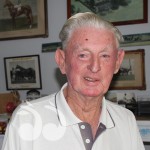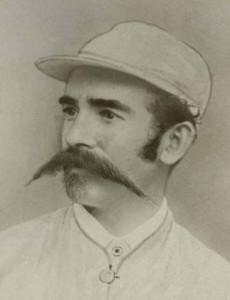Jockey’s Dice with Death
By Harley Walden
 IN the racing game these days most people consider it to be a “jockey’s world”.
IN the racing game these days most people consider it to be a “jockey’s world”.
No doubt the little men are well provided for when they win races, but the risk there their lives every time they mount horses in the enclosures on race days.
From the start of racing in Australia, there was far more hero-worship lavished on jockeys then there had ever been in England.
The first Australian professional jockey, John Fisher, was reported to have ridden at eighty years of age and lived to ninety-nine.
The men who rode the early champions such as Hector, Junius, Jorrocks and Archer were far from under-privileged jockeys.
John Cutts, who won the first two Melbourne Cups on Archer was well set up.
Owners consulted their jockeys freely and good horsemanship was well rewarded.
This tendency to lionize jockeys was rejected in the space journals gave to successful race riders.
Race descriptions invariably included lines about the ‘leathering’ of the horses involved.
Garry Yowen, in reporting the first Flemington meeting, noted that jockeys were quite proud of their colours and rode with an utter recklessness to themselves and their mounts.
In 1928, after Junius had won another Brisbane Cup in Sydney, his owner, Mr Murray, offered 500 guineas to an horse that could beat Junius in a race ‘three times around the Sydney course’.
Junius’s regular jockey, James Spinks, hearing of this challenge, publicly increased the offer to £1,000 Spinks had won on Junius at Campblelltown and again at the Bellevue Hill track despite a broken stirrup –iron.
A fine horseman, he was the predecessor of the colony’s most notable rider, John Higgerson, who rode Jorrocks and many other star performers to victory.
Higgerson was the rider Etienne de Mestre chose to take with him to Melbourne to ride Veno in the famous 1857 match race against Alice Hawthorne.
Higgerson died in 1905, aged ninety-five at Heathcote on the outskirts of Sydney, where there still is a Veno Street.
In the years when most of our major races and clubs were consolidating, the great virtuoso of the saddle was Tommy Corrigan, who rode his first winner in the Victorian town of Woodford in 1865, his last at Caulfield in 1894.

Jockey Tommy Corrigan wagged school to ride his first winner and over the next twenty-eight years became a public idol.
Corrigan was born in County Meath in 1854 and migrated to Victoria with his parents who took up farming at Woodside.
Tommy wagged school to ride his first winner and over the next twenty-eight years became a public idol by winning almost every major race in both Victoria and New South Wales and showing equal skill across country, on the flat or over jumps.
Corrigan’s great popularity stemmed from his fearlessness and his honesty.
Warned of a horse’s reputation of throwing his jockeys, he would insist that only badly-handled animals remained bad tempered.
He was a devout churchman and a devoted father and husband.
When he walked the streets of Melbourne people stopped to pay their respects to the ‘merry-hearted little Irishman’.
Corrigan had his first ride at Flemington on Melbourne Cup day, 1867, when he was thirteen.
He grew a seven-inch moustache, of which he was inordinately proud, he became known to racegoers throughout Australia, as did his flair for a quip.
On an August day in 1894 before the start of an important steeplechase at Caulfield, the Governor, the Earl of Hopetoun, wished him luck and Corrigan said, ‘Wouldn’t you like to be coming with us, sir’?
Corrigan’s mount Waiter, which he owned fell at the fourth hurdle, throwing Corrigan on to his head.
His brain was damaged and he died next day, aged forty.
Corrigan’s funeral was a remarkable event which stirred all Melbourne.
But the V.A.T.C. had to pay for it because Corrigan had died penniless after a lifetime of giving his money to touts and racecourse urgers.
Thousands lined the streets to the cemetery and 150 jockeys and trainers marched ahead of the hearse.
All Melbourne shops closed, flags were at half mast, a city mourned.
From a career total of 788 mounts Corrigan had ridden 239 winners, 135 seconds and 95 thirds.
His wins included seven Grand Nationals.
 scone.com.au
scone.com.au